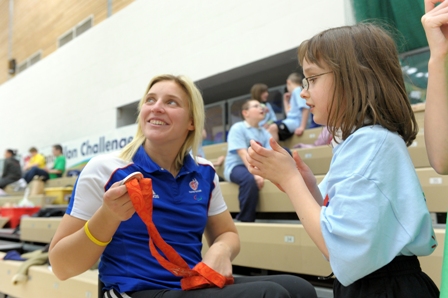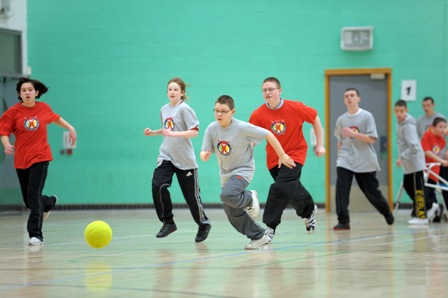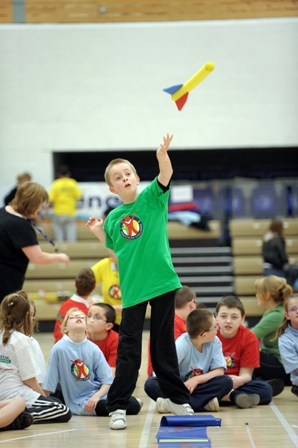
Paralympian Shelly Woods helps out at the Panathlon
Take your partners for the Panathlon
Now in its thirteenth year, the national disability charity Panathlon has been steadily growing in influence. Merseyside Sport’s Katie Crozier sought some feedback on the effect their work has had in her part of the North West.

Paralympian Shelly Woods helps out at the Panathlon
The two county events, for both primary and secondary age young people, involved almost 200 disabled young people from across Merseyside. In the run up to the event, however, over 400 young people have been coached at local schools, taken part in local authority led competitions and assessment days. It is this development activity that helps Merseyside Sports Partnership stand out.
Penny Moorfield, senior competition manager for Merseyside explained: “The Panathlon Challenge is a great way of getting all the authorities/boroughs and the Merseyside competition management team working together towards a county event and it gives them a focus towards P2P [Playground to Podium]. Boroughs have set up ‘gifted and talented’ days, including athletics and boccia within those events, as well as individual competitions in some of the P2P sports, to identify children to take part in the Panathlon Challenge. Sefton actually did its own local Panathlon Challenge to finally select their squad to come to Greenbank.”
Playground to Podium is the new national strategy for the identification, development and support of talented young disabled athletes, developed by the Youth Sport Trust, Sport England, UK Sport and the British Paralympic Association. The Playground to Podium framework forms a pathway which will take young disabled people from physical education, through participation, to high-level performance and competition.
As well as providing a structure for disability sport development in Merseyside, the Panathlon Challenge has also helped local authorities reach out to disabled children in mainstream schools. As John Doran, school sports co-ordinator for Sefton, explained, events like this are vital for disability sport.
“Experienced coaches, PE teachers and support staff completed individual assessment sheets for every young disabled child in Sefton,” he said. “From this we were able to pinpoint the talented athletes, who were then invited to train in a representative squad. The system also allowed us the opportunity to identify core basic abilities using the ABC format of agility, balance and co-ordination. Each child has an ability, whether that be a core ability which can be developed or an elite ability which needs to be identified so that they can be chosen for the squad.
“Because the PE departments were involved in this process, they can now teach the various sports. The schools that took part included some specialist schools but were mainly mainstream. Using the inclusion spectrum, disabled children can be actively involved in the same sports as mainstream kids so that they feel part of the session. Adaptations are hard at first but it’s getting less unusual in mainstream schools.”
Donna Hall, senior development officer for Knowsley Borough Council, continued: “The Panathlon has always been a high-profile event in Knowsley. We identify gifted and talented individuals from mainstream and special schools and direct them to the P2P clubs in the area. One-to-one coaching is provided for the young people and their teachers to enable a more sustainable coaching pathway. The young people that are identified are fed into the borough talent identification days through the P2P initiative in order to develop their talents further.
“Knowsley has been working with disabled children in mainstream schools for the past three years and now every primary school in Knowsley has boccia training courses and competitions because it is an inclusive event. It’s great to see young people of all abilities taking part.”
As well as the developmental side to the Panathlon Challenge, Merseyside Sports Partnership also works closely with local partners to help deliver the event. This year eleven students from Liverpool John Moores University attended training with event organiser Steve Sullivan and then helped to run the event, giving them vital experience of both managing sports events and working with disabled children.
Student Becky Warner welcomed the opportunity: “When I volunteered to help at this event, I thought to myself, ‘Wow, I can really help these children by doing something so little, and just supporting them.’ I feel that this competition was a great opportunity to have fun and develop their skills, no matter what their age, gender or ability. These types of events are successful as they are creating opportunities for all of the people involved; and the teachers, co-ordinators and volunteers are very supportive. This experience has opened my eyes and I feel I would like to continue volunteering and helping out those who really need and appreciate it.”
Ashley Iceton from Panathlon Challenge attended the Merseyside events this year and has his views on the way in which Merseyside Sports Partnership have adopted the initiative. “The relationship with Merseyside Sports Partnership (MSP) is the best model in the country,” he said. “It is an example of an initiative like the Panathlon being picked up and run by a county sports partnership where the core essence of the original idea nine years ago is retained and improved at a local level. The Panathlon charity supplies coaching monies which MSP put to use in delivery at a local level. We then supply team t-shirts and medals, while the local delivery is done by MSP to a very high standard.”
Future development of the Panathlon Challenge is being considered as its success continues both in Merseyside and across the country. “Panathlon is working with the sponsors and partners to try to create a national final,” Ashley explained. “This would enable the winners of each county get to compete against each other. However, this may take a few years to fund so we are looking at possibly 2011 or 2012.”
Local delivery will continue to improve as best practice is shared across Merseyside. Penny Moorfield again: “Many of our boroughs now have a school sports co-ordinator with responsibility for inclusion, working with key partners, such as partnership development managers, competition managers and sports development. Our challenge is to find and target all of our disabled athletes regardless of the school they attend. The Panathlon Challenge is a real focus for our boroughs to work towards, with each borough wanting to be more successful than the next. However, by ensuring that we have the very best of our athletes competing from each borough and that we are engaging more disabled athletes on the talent pathways for those P2P sports we enable all of our athletes to realise their potential. On the run up to London 2012 this structure for competition is an essential legacy.”
Donna Hall explained how development has already led to great success for Knowsley: “Given the diverse make-up of the squads for Panathlon, and the fact that more and more young people with disabilities are attending mainstream schools, I feel that it is really important to work closely with education in order to identify and support individuals from the mainstream sector. This has definitely been a key to the successes the young people from Knowsley have had over recent years. The follow on from Panathlon for our young people is the continued coaching in the clubs which allows us to identify a squad to take part in the regional Disability Sports Events athletics competition and then from that to national disability athletics. This is a perfect example of how local coaching can lead to national participation along a player pathway. The Panathlon is a key event within this structure as it provides a first level of competition for the young people and the coaches to benchmark against other people with similar disabilities.”
Sue Barry, a teacher at school commented: “The Panathlon is a good competition between boroughs and it is at a good standard. For some taking part it is their first sports event and it’s the adrenalin of the competition that is so important. Through Steve Sullivan we know what’s happening when and we are involved in every tournament we can be because of the good links with Merseyside Sports Partnership. Interaction in this competitive environment is so important for the young people involved and it’s great to have an event like this for them to come to.”
Steve Sullivan, senior development officer (events) for Merseyside Sports Partnership is the person responsible for co-ordinating the Panathlon Challenge in Merseyside. “The Panathlon Challenge could be the beginning of a young person’s sporting career or a further step on their performance pathway,” he said. “Most young people will have been coached in the sports before they got to the event but it’s the experience of competition at county level that really helps with the identification of talented individuals.
“Following this event we need to encourage disabled young people to attend accredited clubs to get them more quality coaching and further develop their potential to enable them to progress through to national squads. We have representative North West squads in boccia and athletics and events like this help to further strengthen our squads, especially with disabled children from mainstream schools now realising the opportunities available to them.”
Katie Crozier is senior development officer (marketing and research) for Merseyside Sports Partnership
The Leisure Review, April 2009
© Copyright of all material on this site is retained by The Leisure Review or the individual contributors where stated. Contact The Leisure Review for details.
Download a pdf version of this article for printing

Panathlon football at full speed

Panathlon darts: double top a likely verdict